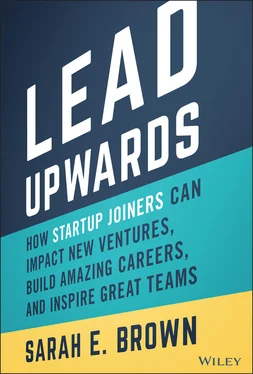EXECUTIVES HAVE THE MOST CONTEXT OF ANYONE IN THE DEPARTMENT
As an executive, in most situations, you'll have more context about the business than others on your team. I didn't realize how much this context impacted my team's decision‐making until I became an executive. A full schedule of cross‐functional meetings gave me a real‐time understanding of the business that no one else on my team had. It was up to me to regularly communicate these to my team so they could be effective in their roles. It's an executive's job to communicate to their team what's going on outside a department to others. Due to the pace of startup life, this isn't always as expeditious as the speed at which they're garnering new intelligence. Some information can't be shared with the team due to confidentiality or other concerns.
This may sound simple, but it's a powerful concept. As a leader, you'll often know more than others on the team about any given topic. You have to somehow get everyone rowing in the same direction on a regular basis when they can't know all of what you know right away.
While you can't share everything with every team member at all times, with your guidance you can steer your reports towards what they need to be successful in their roles. It helps to build trust so that they will follow you as you make decisions to which they don't have full visibility.
WHO'S QUALIFIED TO BE A STARTUP EXECUTIVE?
There is no minimum number of degrees nor years of experience required to be a startup executive. You read that correctly: None. There are 24‐year‐old CEOs of startups and there are 24‐year‐old VPs of sales at startups. Some startup executives have MBAs from fancy top‐tier business schools and thirty years of business experience. Others didn't graduate from high school. Some don't become startup leaders until they've got two decades of business under their belts and some are promoted after five or six years of startup experience.
No lack of credentials should keep you from aspiring to become a startup executive. Will a twenty‐six‐year‐old who's been working for four years be better suited to be a successful startup executive than someone with two or three times that amount of experience? It depends, just as it depends for founders. According to Harvard Business Review , the average startup founder is 45, even though stereotypes would have us believe it's much younger. 1
Here's another stat from Harvard Business Review that motivated the inception of this book: women tend to only apply for jobs that they're 100% qualified for vs. men will apply when they only meet a selection of the criteria listed. 2
Harvard Business School author and leadership coach Anne Morriss says that, based on her and her partner Frances Frei's research, demographics bear no weight on who succeeds in a leadership role.
“Our research shows there aren't major demographic differences in who ends up ‘killing it’ at a startup in a leadership role,” says Morriss.
“Demographics do matter in who gets promoted, who receives the resources, and who has access to the networks,” says Morriss. “But once you make it into a leadership role, the people who thrive are those who bring curiosity to their own strengths and weaknesses and the strengths and weaknesses of the individuals around them.”
NO ONE IS TRULY QUALIFIED TO BE A STARTUP EXECUTIVE BEFORE THEY'VE DONE IT BEFORE
Another crucial point to let sink in: no one is fully qualified to be a startup executive until they've done it, because there are skills and job requirements you can't master until you've encountered them. This is true whether you're a “big company” person learning to map your skills to the startup arena or a mid‐level manager or director aiming to “scale up” to mature with the business.
Unfortunately, in the past, many members of the dominant group in the startup industry have found a way around this fact by being promoted based on potential , which often translates to “looks like the guy who had the job previously.” According to Kim Scott, executive coach and author of the bestselling business books Radical Candor and Just Work , “Men are more likely to be rewarded for perceived potential, whereas women get promoted purely based on past performance.” 3
So how do we help a broader group of people translate the skills and qualifications they have into a startup leadership role? We need to remove the bias of “qualification by association” and break the role down into objective, essential requirements.
WHAT QUALIFICATIONS AND SKILLS ARE ESSENTIAL ON THE JOB AS A STARTUP LEADER
Due to systemic and internalized bias, many qualified people never go for leadership roles in a startup, even if they want them. About ten years into my startup career, I noticed that many startup leaders had backgrounds that looked comparable to mine on paper before going for the executive role. I wondered what their resumes were missing that made them qualified.
It turned out that these individuals were not necessarily more qualified. Once in the roles, they'd learned the skills of the role, which was something I (and many others) were perfectly capable of doing too. If you're comparing your resume to someone else's, you may not see the work they've done or the mentorship they've received outside of their official roles. And, truth be told, many startup executives get their first “shot” based on perceived potential and learn the skills they need on the job. So let's unpack the skills and backgrounds that are necessary to become an effective startup leader.
Here's what you do need to make the leap from mid‐level contributor to startup leader:
Valuable and measurable expertise and track record of success in a key startup functional area (e.g., engineering, marketing, product, sales, customer success, operations).
Some experience in management. If you're a first‐time startup executive and first‐time manager, it will be much harder.
Willingness to learn how to work with financial shareholders. Until you've done a board meeting (we'll talk about how to prepare for these), you won't know what it's really like.
Willingness to learn how to communicate effectively at scale, with multiple stakeholders. Make great slides and write clearly and persuasively.
Be data‐driven. All startups require data to inform their decisions, and today's startup executives are expected to develop data literacy.
Willingness to fail and improve. Startups are built around learning and iterating. You'll need to do this constantly in your role to see which areas of yours are underperforming and need adjustment, using data (see above).
The key element in all of the above is a willingness to learn . If you want to be a startup leader, don't fret if you don't have all of the skills and experience at this very moment in time, because, in reality, no one does before doing the job. You can do it and learn along the way. (We'll talk about the “how” for addressing skill gaps in the next chapters.)
The phrase “growth mindset” coined by Carol Dweck is a Silicon Valley favorite for a reason; it's crucial for people at any role in a startup to learn, adapt, and grow, but the executive especially must grow their abilities as their startup grows.
Empactr co‐founder and CEO Chris Senesi says the key skill he looks for in startup leaders is that they, above all, are initiators.
“I like when an individual is passionate about something and they champion it,” said Senesi. “Taking initiative and ownership in an area builds trust. Leaders then get to create something new and show their skills and expertise. You don't have to be a startup founder to initiate.”
Читать дальше










